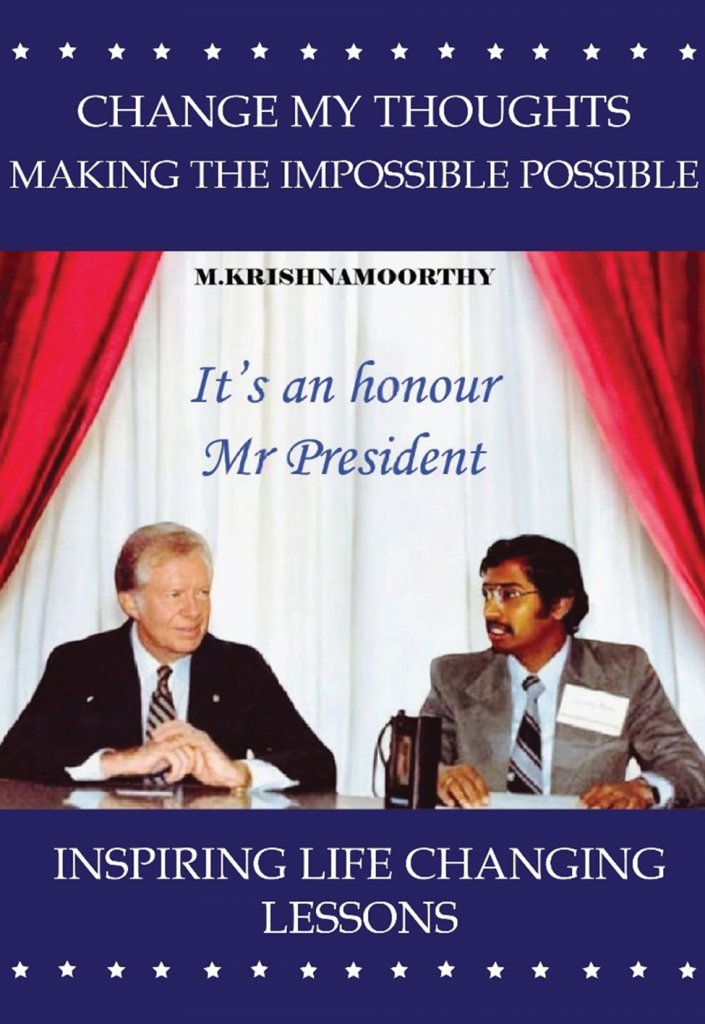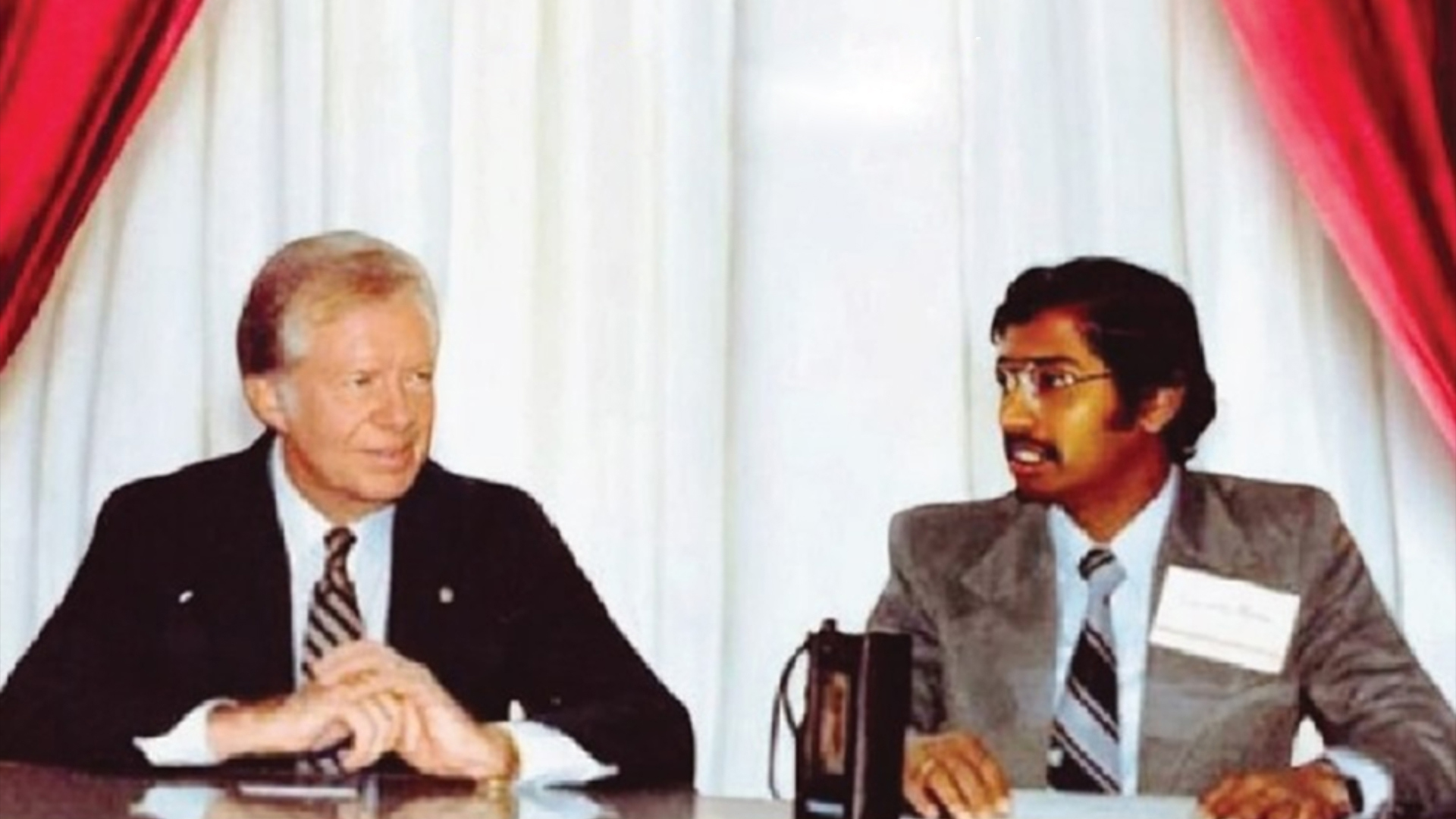The former peanut farmer US President Jimmy Carter died after celebrating his 100th birthday in October this year. On 9 Oct 1982, I had the privilege of organising and chairing a meeting with President Jimmy Carter.
It was not easy being president of the International Students Association at the University of Tennessee, Knoxville, as my proposal to organise a meeting with Jimmy Carter was impossible, the authorities in the university told me.
Today, my book Change My Thoughts: Making the Impossible Possible, soon to be published, traces the challenges I faced in organising the historic meeting with President Carter.

As a student in the United States in 1982, now retired Associate/Adjunct Professor and freelance journalist, I faced an uphill task as a student leader back then.
Amidst a difficult environment marked by the rejection of my proposal to organise a meeting with President Jimmy Carter, I set my sights on achieving my aspiration with unwavering perseverance and determination.
Despite numerous hurdles, I courageously turned obstacles into opportunities, ultimately securing a meeting with President Jimmy Carter in the capacity of a student leader.
This is a testament to his resilience. transforming negativity into positivity. “Nothing is impossible; the word says ‘I’m possible,” and I believe in this, to use Audrey Hepburn’s quote.
Fast forward to 9 Oct 1982, the day of organising and chairing a meeting with student leaders and President Carter. 9 Oct 1982: The date that would forever be etched in my mind and alter the trajectory of my life.
As I stood in the World Fair president’s room, I felt the air thicken with anticipation. I couldn’t help but marvel at the journey that had brought me here – a young Malaysian student about to meet one of the most influential figures in modern history – the US President.
The decorative ornate clock on the wall ticked relentlessly towards 10:25 am. Each second felt like an eternity, yet paradoxically, time seemed to rush forward. Suddenly, the heavy oak doors swung open, and the room fell into a hushed silence. Bo Roberts, the fair’s president, entered first.
His usual jovial demeanour was tinged with an air of reverence as he ushered in two figures who seemed to bring a different energy into the room.
President Jimmy Carter and his wife, Rosalynn, moved with a grace that spoke of years in the public eye yet retained a down-to-earth quality that immediately set everyone at ease.
“It’s an honour to meet you, Mr President”
President Carter’s lean frame belied the strength of his presence. His eyes, a clear, piercing blue, scanned the room before settling on me. I felt seen, truly seen, in a way I had never experienced before.
Rosalynn Carter, elegant and poised, stood by his side, her gentle smile a perfect complement to her husband’s focused gaze.
Bo Roberts enthused and paced forward towards me and President Carter for the moment I was eagerly waiting for and made the introduction: “Meet Krishna, Mr President.”
“I’ve been looking forward to meeting you,” President Carter said, his voice carrying the soft accent of his Georgia upbringing. His grip was firm, reassuring, the handshake of a man who had brokered peace deals and navigated global crises.
“Where are you from?” he asked. I swallowed my breath deep and hard, not to betray my nervousness, and replied: “Malaysia, sir. It’s an honour to meet you, Mr President”.
A spark of interest lit up his eyes. “Malaysia! A beautiful country at the crossroads of Asia. I’ve always been fascinated by its diverse culture and rapid development,” he expressed.
As I escorted them to the conference room, my mind raced. This man, who had shaped world events from the Oval Office just a year ago, was now walking beside me, genuinely interested in my home country, Malaysia. The surreal nature of the moment wasn’t lost on me.
The boardroom was a sea of eager faces – student leaders from various backgrounds, all united in their excitement to meet President Carter.
As we entered the boardroom, a wave of applause welcomed us. President Carter raised his hand in acknowledgement, his smile warm and genuine. The room erupted loudly in applause, a tidal wave of sound that threatened to overwhelm me.
But as President Carter extended his hand again, the noise faded away, and the world narrowed to this single point of contact.
Come sit next to me
As he took his seat at the head of the table, he surprised me once again. “Krishna,” he said, gesturing to the chair beside him, “come sit next to me. I’d like to hear more about your experiences as a student leader.”
Overwhelmed by his graciousness, I complied. The weight of responsibility settled on my shoulders as I realised I wasn’t just representing myself but my country and all the student leaders present.
“Thank you, Mr President, for this incredible honour,” I began, my voice growing stronger with each word.
“When we dreamed of meeting you, we never imagined you would choose to visit us during your trip to the World’s Fair. Your presence here today speaks volumes about your commitment to nurturing future leaders.”
As I outlined the purpose of our meeting – to inspire leadership, honour President Carter and foster interaction among diverse student groups – I saw heads nodding in agreement around the table.
But it was the intense focus in President Carter’s eyes that truly drove home the significance of this moment.
Pinnacle of global leadership
President Jimmy Carter, a few months ago, until January 1981, helmed as the leader of the world’s most powerful nation. Here was a man who had stood at the pinnacle of global leadership, now sitting among a group of aspiring young leaders, ready to share his wisdom and experiences.
In his presence, we all felt the weight of potential leadership, the responsibility it carried and the transformative power of genuine human connection.
Resolving world issues
With a friendly, instantly infectious smile, Mr Carter said, “Krishna, I’m happy to be here. I appreciate the honour of visiting the people from the University of Tennessee and student leaders from throughout the world.”
Mr Carter was careful, rational and precise in his remarks; he spoke with earnestness and moral assurance while gesturing for emphasis.
“I kind of like the life now. I do not have the routine daily duties of the White House, but I have a lot of prerogatives of a former President. And one of the great things I have is the chance to travel around this country and other nations, meet interesting people and share views.
I will be working with Emory University, dealing with problems and questions faced by our country and the rest of the world. We will do major projects that we believe cannot be done elsewhere, and I hope to establish a centre over a long time.
It will be a senate to resolve crises and disputes for the people who have serious arguments or differences in their country or between nations,” he said.
They can come to my private centre in Atlanta and, with the trusted mediator, try to resolve difficulties, disputes between them and perhaps avoid a war,” he added.
“At Emory University,” he said, “I will be teaching International Affairs Law, Political Science, and Theology. One of the questions we address in Theology that you may be interested to know is how the world religions impact the world and human events.
Some of the great achievements of world history were because of religious beliefs. Almost all the religions you know, Hinduism, Islam, Buddhism or Christianity, have a basic premise: understanding, communication, brotherhood, love and peace.
The question of why everybody wants peace but can’t seem to get it should be addressed by the greatest thinkers of our time,” Carter stated. The discussion shifted to the state of the U.S. economy when I asked: “Has Reaganomics solved the country’s economic problems?”
Pursue human and civil rights policies
“When I left office,” Mr Carter said, “There wasn’t a high school graduate who was academically qualified who couldn’t get a college education through loans, grants or scholarships. All that has been taken away. The best investment is in people or human resources.
We have gone backward in providing services to our people. It’s been a great failure and a tragedy for our country. Under President Reagan, the nation’s deficit will exceed all the peacetime (deficits) ever served in this country in 200 years,” he said.
Mr Carter had an uncanny ability to crystallise issues by distilling them to their essence.
Although Mr Carter said he generally approved of Mr Reagan’s stand on the Middle East, he found fault with the President’s handling of other international affairs, including incidents in Africa, Latin America and the Falkland Islands.
Carter also criticised Reagan’s cutbacks in aid to the poor and Reagan’s approach toward soaring unemployment rates. He also pointed out that Mr Reagan has not pursued human and civil rights policies.
“Other than that,” he chuckled, “I think he’s done a pretty good job.”
What does it take to be a president?
To another question by an American student leader: “What does it take to be President?” He replied: “A little more than an ordinary man. Anybody who says he’s qualified must have a lot of ego, ambition, self-confidence, honesty, integrity and tenacity.”
His approach was crucial in steering the US to overcome the complex and nearly impossible challenges of creating a sound economic nation. His systematic, unhurried, and logical approach was partly developed by his training as a top-class engineer.
Loneliness
Reflecting on his four years (20 Jan 1977 – 20 Jan 1981) as President, Mr Carter said: “All difficult decisions are made in an element of loneliness, a loneliness that requires a certain amount of courage in the final analysis.”
As the meeting ended, Mr Carter called his wife, Rosalynn Carter, to the forefront and remarked, “She is my greatest political adviser, and she could have answered all those questions better than I did.”
On that note, I profusely thanked him again and led him out as the Presidential security escorted him to the World’s Fair national pavilions.
To me, that night, the stars appeared more dazzling than ever. Slowly, I began to see a pattern forming in the dark night. As I lay on my bed in the dormitory, I reflected, as my heart listened intently and as my mind mused:
“What an achievement for students, the university and myself as a person who organised and chaired the historic and unprecedented meeting.”
M. Krishnamoorthy is a media coach, adjunct professor, and undercover journalist. With decades of experience, he has contributed to major news outlets like Bernama, NST, and Malaysiakini. He also collaborates with international networks like CNN and the BBC. Visit imkrishna.net to learn more about his work.
Note: My book Change My Thoughts: Making the Impossible Possible, soon to be published, traces the challenges I faced in organising the historic meeting with President Carter

